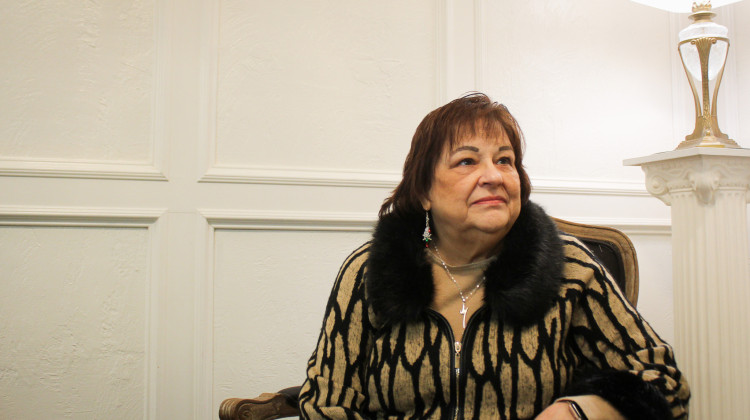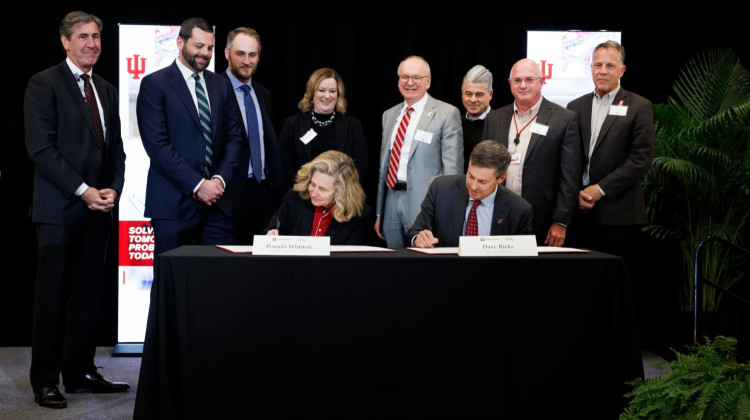
Greg O’Brien is a journalist and co-host of The Forgetting, a podcast about living with Alzheimer's disease.
Courtesy of Greg O'Brien
More than five million Americans are living with Alzheimer’s, according to government estimates. Greg O’Brien is one of them. He’s a journalist and co-host of The Forgetting, a podcast about living with the disease. We talked with O’Brien about the stigma surrounding the illness.
A transcript of the interview appears below. It's been lightly edited for length and clarity.
ISAIAH SEIBERT, SIDE EFFECTS: Greg O'Brien, thanks for joining me.
GREG O'BRIEN: It's an honor to be here.
SEIBERT: You've been very open to sharing your experience with Alzheimer's. You have a memoir, a podcast, and a series on NPR. Why is it so important for you to share your story?
O'BRIEN: It's personal for me. I lost my maternal grandfather, my mother, my paternal uncle, to Alzheimer's. And before my father died, he was diagnosed with dementia. Years ago, I started the symptoms and was diagnosed after a series of brain scans and spect scans and clinical tests. And two serious head traumas that doctors said exacerbated the diagnosis. I also carry the Alzheimer's gene ApoE4, and there's a 50 percent chance that my children could have the disease and my grandchildren.
My journey is not about me. No one should really care about me. I'm a journalist just like you. We're telling the story, reporting the story. It's trying to get people to focus on the disease, the inaccuracy of the stereotype of the disease, and building a critical mass to try to get people out and realize that we really have to stop this. And also at the same time, this disease can take 20 to 25 years to run its serpentine course, and experts will tell you that the pathology without symptoms can start when you're in your forties.
This isn't your grandfather's disease, and my journey has been trying to get people to talk in faith, hope, and humor about Alzheimer's while the doctors and the researchers race for a cure because there are so many people who are afraid.
We wouldn't talk about cancer. We wouldn't talk about AIDS. We need to bring Alzheimer's out of the closet.
SEIBERT: What do you hope people will take away when they listen to you?
O'BRIEN: I hope they look in the mirror. I don't want their pity. I don't want them to look at me. I hope they come to understand the disease. I hope they learn more about the disease. I hope they look to their families. I hope they look to relative of the past, and I hope they learn more about it and be more open to it.
Alzheimer's, as I said before, is not the end stage. It's not [that] you're 80 years old and you're in a nursing home. It starts when you're in your fifties or your sixties, and most of the people in this stage are afraid to talk about it. They're afraid of losing their jobs. I know a lot of people who aren't able to do their jobs. It attacks sometimes the left brain more than the right brain, and so as a writer, it's been easier for me because I have strategies of a reporter. But it's horrible.
SEIBERT: What responses do you get from people when they hear you?
O'BRIEN: I'll give you an anecdote. I gave a speech to the Alzheimer's Association in Maine a while back, about 500 people there. And what happens in this disease, I've always told people, your brain is like an iPhone in the early stages, and I'm in the early-to-mid-stage. It's still a sophisticated device, but it has a short-term battery, it pocket dials, and it gets lost very easily, and it drifts out.
Before I gave my speech, I was with my son because I don't travel alone anymore, and I had a blackout. The woman who was in charge of the speech came up to me, and she said, "Are you okay?" And I said, "No, but I'm going to give the best speech of my life." I don't speak off-the-cuff. I write out everything I'm going to say, and when I got out to the audience, I said, "Look, here's what happens. Here's what just happened a few minutes ago. This is Alzheimer's in real time. I'm going to miss some spots. I'm going to forget where I am. Work with me."
I missed spots, and they stayed with me. When I was done, they gave a standing ovation, and I said, "Well, that's nice. Thank you very much."
I didn't want it to be out of pity. I was exhausted because the battery was dead, and I went into the lobby of this hotel in Maine just to decompress, and I looked up, and there were 100 people standing in line. They didn't want to talk to me about me, because I didn't want to talk about me. They wanted to talk about them and their families, and I said, "Ok, they're getting it." And that's the reason for this journey.
SEIBERT: You were diagnised 10 years ago, is that correct?
O'BRIEN: About nine years ago. And if it's a 20-year disease, I could have another 10 years. I was diagnosed probably 10 years earlier before someone would have had a diagnosis because I was the family caregiver for my mother and father who stumbled on this disease, and I had two serious head traumas, and I felt the symptoms coming on. As an investigative print reporter, I couldn't multitask, I couldn't do my job. I needed help, so I reached out to one of my best friends who's my personal physician, and he connected me with the experts in the Boston area, who did the test and the diagnosis.
Early diagnosis is so important. Don't be afraid. Maybe that's one of the important things to say here. Anyone who is having a problem, please don't be afraid to have a clinical test. That's the most important thing we're talking about today. Reach out. Reach out to professional people who know how to do this. You need to go to the best possible professional people who do these clinical tests, and if it comes out that you need help, it's okay because you're going to be better off that way than the other way. It's a long journey. There are medications. There's strategies and pills. As the great Bugs Bunny once said, "Don't take life too seriously because nobody gets out alive." Just help yourself.
SEIBERT: You mentioned that there's a lot of misunderstanding surrounding Alzheimer's. Do you think that prevents people from seeking care?
O'BRIEN: Yeah, it's a taboo. It's the brain. Isaiah, it's called dementia. That's the umbrella word for cognitive impairment of which Alzheimer's is the chief disease. Listen to the word. It sounds like a demon howling in the desert, and so nobody wants to go there. I don't know if you know this: I have cancer, too, and I'm not treating it. It's my exit strategy because I've been to the nursing home with my mom and dad, and I'm not going to take my family there. I deal with intense depression, and we face bankruptcy. It's not a sob story. I'm just an envelope for other people. It's just understanding that there's help out there.
The greatest thing in Alzheimer's is the isolation. My mother used to talk about that, and I was there at her deathbed. I held her hand before she died, and I said, "You know? We're going to start to talk about this."
SEIBERT: Many people have secondary familiarity with Alzheimer's. They may know of a family member or a friend who's living with the disease. But how do you describe it to people have never experienced it?
O'BRIEN: When I give a speech, I will ask people, "How many people have ever lived in a home with a basement? Please raise your hand." People who are listening can think about that. "How many people have ever done their laundry down in the basement? Please raise your hand. How many people have ever done their laundry down in the basement when someone up in the kitchen didn't realize they were down there and shut the light off?" It's penetrating darkness, and that's what early onset Alzheimer's is like. The light is on. The light is off. The light is on. The light is off. But you know one day, someone is not going to be up in the kitchen to turn the light back on.
The stereotype of it is you're 85 years old, and you're drooling, and you're incontinent. And by the way, I'm incontinent today, and there are times that I do drool. But you're in the nursing home, and you can't speak. That's the final stage. This is a 20- to 25-year journey, generally. There are cases where it moves quicker, but I will tell you this: So many people from time to time say to me, "Well, my mother was diagnosed, and she died seven years later." To which I say, "Well, I mean that's really so sad." But then I will say, "In all likelihood...is that your mother carried this disease for 20 or 25 years and was afraid to talk about it."
And if we could get society to start to talk about this and empower people so they feel that they're not dead with this disease, you're just living with a demon that you have to fight every day and you can still do good things. And I think that's a legacy, and I want that for my children. As I said, my journey is not for me. The train has left. I ain't coming back. But it's for my children, your children, your grandchildren, and the children and grandchildren of the people who are listening.
SEIBERT: You just talked about empowerment. And in the podcast, you repeat three words a lot of the time: faith, hope, and humor. What do those things mean to you? Are they a source of empowerment for you?
O'BRIEN: Yeah, well the humor is pretty simple. I'm Irish Catholic, the most imperfect sinner in the world by the way. I've committed every sin a man can commit but murder and adultery, but I have a strong faith in God. But I'm not proselytizing. Everyone finds their own level of faith, but it's a matter of faith in a higher power, I believe. And the hope is the hope for a cure, and the humor is what gets you through it, to be able to laugh. In Alzheimer's, in some ways you lose your filter. There's some part of your brain that doesn't connect. I joke about it. We become more Larry David-like, childish-like, and I'm kind of enjoying it, where you say things that everyone else wants to say but they're afraid to say, and all of a sudden you say something and they go, "Oh my God, I can't believe you said that."
SEIBERT: You're no stranger to the disease yourself. You mention that some of your family members have had it. You've had it for going on nine years now. But has there been anything in your journey of living with it that surprised you, that you weren't expecting at all?
O'BRIEN: People think of Alzheimer's as loss of memory. It's generally a loss of short-term memory, but that's not what the disease is. The disease is a total breakdown of the body. The mind is the control panel for the body. Right now, today, and I could sit here because I'm prepped to do this, but after this interview, like I said, my brain's like an iPhone. My battery will be dead. It runs for a short period. But what people don't understand is in Alzheimer's, it attacks at all different levels. It attacks in rage. Sixty percent of my short-term memory can be gone in 30 seconds.
You deal with intense depression. You deal with scary hallucinations. There's a numbness. I have no feeling now from my feet to my knees. It's neuropathy, but it's also brain signals, not going down because the body shuts down because the brain is a control panel for the body.
I told you the situation of the lights in the cellar, but realize that there's a light out there and reach for it. And that light is faith, hope, and humor and the company of others. You can't fight this disease alone.
SEIBERT: We got to the end of my questions. Is there anything else you want to add that we didn't touch on?
O'BRIEN: I just hope people reach out and talk. That's the most important thing. We need to talk about this. God bless anyone who's listening.
SEIBERT: Thank you very much, Greg O'Brien, for chatting.
O'BRIEN: Thank you. Take care.
This story was produced by Side Effects Public Media, a news collaborative covering public health.
 DONATE
DONATE








 Support WFYI. We can't do it without you.
Support WFYI. We can't do it without you.